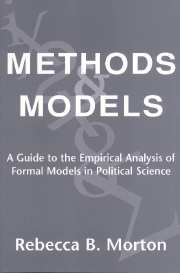Book contents
- Frontmatter
- Contents
- Acknowledgments
- I Introduction
- II Formal Models in Political Science
- III Empirical Evaluation of Formal Models
- 4 Fundamentals of Empirical Evaluation
- 5 Evaluating Assumptions
- 6 Evaluating Predictions: Equilibria, Disequilibria, and Multiequilibria
- 7 Evaluating Relationship Predictions
- 8 Evaluating Alternative Models
- IV A Second Revolution
- References
- Name Index
- Subject Index
8 - Evaluating Alternative Models
Published online by Cambridge University Press: 10 December 2009
- Frontmatter
- Contents
- Acknowledgments
- I Introduction
- II Formal Models in Political Science
- III Empirical Evaluation of Formal Models
- 4 Fundamentals of Empirical Evaluation
- 5 Evaluating Assumptions
- 6 Evaluating Predictions: Equilibria, Disequilibria, and Multiequilibria
- 7 Evaluating Relationship Predictions
- 8 Evaluating Alternative Models
- IV A Second Revolution
- References
- Name Index
- Subject Index
Summary
At first glance, evaluating alternative models appears to be a higher level of empirical analysis than simply assessing the assumptions or predictions of a given formal model. After all, an evaluation of alternative models provides us with a theoretical substitute for the rejected model, something that an assessment of a single formal model does not provide. First, however, we need to determine if the alternative models truly are contrasting explanations with sets of assumptions that are inconsistent with each other. Sometimes testing alternative models provides less insight than devising a more expansive theoretical formal model and evaluating the predictions of that model. Thus, the decision to assess a formal model against an alternative model or models is not always the best choice and should be carefully evaluated.
In other cases the models are contrasting, with sets of assumptions that are inconsistent with each other and distinct predictions. Yet in most situations models have more complex relationships – are both substitutes and complements – and testing between them is more difficult and less likely to yield conclusive results. Finally, some alternatives to formal models are “nonformal” models. How should empirical analysis be constructed with both formal and nonformal explanations tested together? Before dealing with these issues, I first present an example of an empirical analysis that shows how two seemingly alternative models may actually be special cases of a general model.
Alternatives or Not?
The formal literature on the motives of campaign contributors presents two standard views. One perspective sees campaign contributions as “position-induced,” in which contributions are given in order to help preferred elected officials achieve victory.
Information
- Type
- Chapter
- Information
- Methods and ModelsA Guide to the Empirical Analysis of Formal Models in Political Science, pp. 242 - 276Publisher: Cambridge University PressPrint publication year: 1999
